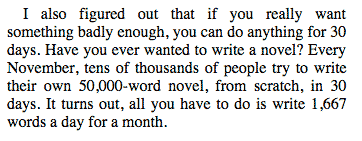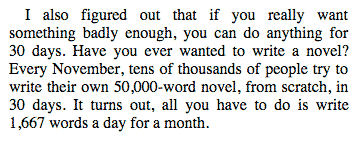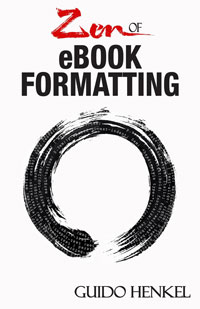The case of disjointed word pairs – eBook Formatting Tip
Over the past weeks I’ve been reading a number of non-fiction eBooks—don’t ask me, why, it just happened for some reason. The interesting thing is that I noticed a number of recurring eBook formatting problems that permeated virtually each one of these books, and I thought I’d touch upon the subject for a change.
The problem in question revolves around terms that should be treated as a unit. Take a look at the screenshot and see if you can figure out what’s wrong with it.

The problem her is, of course, the way the term “30 days” has been line wrapped—twice actually, and the term 1,667 words has been wrapped also. Plenty of bad formatting going on here!
When you have something like this term, a professional typesetter will always make sure that the individual words in the term will not be word-wrapped… ever. There is nothing worse than having the number “30” on one line and the word “days” on the next, or worse yet, on the next page. It just doesn’t look professional and instantly gives off a whiff of amateur that you do not want in your book.
In novels this is oftentimes not such an acute problem, because most authors would actually write “thirty days” instead, which can be wrapped perfectly fine, but by their very nature, non-fiction books often wrangle a lot of data and as such it is no surprise that I found the error striking in the past weeks in particular.
Naturally, the same applies to terms,such as “3 months,” “4 years,” “5 minutes,” “10 dollars” and so forth. Other occasions where you may find terms that should never be wrapped is in dates, for example, such as “November 5,” “Day 3,” “3 AM” or even in situations like a “1964 Mustang” or a “1953 Corvette.”
The most prevalent occurrence of such terms, in both fiction and non-fiction is on cases, such as “Mr. Potter,” “Mrs. Bates,” or “Dr. Jekyll,” and one could even go as far as applying the rule to terms such as “Agent Mulder.”
The solution to the problem is fairly simple, really. If you are formatting your eBook in HTML, you simply replace the space between the words of the term with a non-breaking space character, like this: 30 days. This way, you disallow the eBook software to break apart the entity.
To achieve this one can use a very simple Regular Expression to isolate the cases. The concept is to search for one of multiple digits, followed by a space character, followed by a letter.
A simple search expressions like this
([0-9]) ([a-zA-Z])will locate such instances. I do not recommend simply running a replacement on this search, however, because there would be too many false positives. Instead, simply go through them one by one and decide whether they need to be adjusted or not. I know, this is time-consuming, but that’s part of the reason why professional ebook formatting costs a bit of money.

As you know, I do not recommend exporting eBooks straight from word processors, but I do understand that many authors do so nonetheless. It is possible to avoid this kind of word-wrapping in word processors as well, by replacing the space character with a Ctrl-space character. And voilà…
If you can actually make this practice to use Ctrl-space in all the right places part of your general writing habit, all the better, you will be properly prepared right off the bat, and you will make the life of your eBook formatter a whole lot easier.
The thing about this kind of eBook formatting error is that it is not something that readers would report to you, but it is wrong nonetheless. It gives authors the impression that nothing is wrong with the eBooks, when, in fact, there are formatting errors in it. Many such issues can be evidenced in eBooks, pitfalls that most people are not aware of but that hinder the reading flow and somehow give off a bad impression.
That’s why it make sense to hire professionals to handle your eBook formatting. Someone with credentials, someone who understands actual typesetting, in order to make sure these kinds of things don’t happen.
Will you take a look at your books and see if you’ve been a victim of this particular pitfall?

Zen of eBook Formatting is currently on sale for only $2.99 instead of its original $5.99 price!
If you want to keep up with my eBook formatting work, don’t forget to subscribe to my Newsletter. That way I can keep you updated about the latest developments, updates to my books, code snippets, techniques and formatting tips.
Also, don’t forget to check out my book Zen of eBook Formatting that is filled with tips, techniques and valuable information about the eBook formatting process.

Been following your advice on creating an ebook. Got stuck so I bought Zen–figured I owed you the books price for the information you’ve already provided me, anyhow. The book is definitely worth it but I still haven’t solved my problem. My images will not resize for Kindle. I created a css img.logo and set the height:3em; followed your instructions “span class=”centered”> (just retyped that so it might have an error here, but I’ve double-checked from Zen to my html.) I convert the file using Calibre to MOBI and open it in the newest version of Kindle for the PC. The image, (small 8kb) remains the same size when I change the font size. I’ve gotten everything else to work–the book is ready to go if I could fix this one problem. Been working on it for three days. I know I’m missing something. Any suggestions would be appreciated.
Rats! My coding got erased in the previous post: Thanks!
That’s the only real typesetting error here – repetition.
Going through all the other mistakes in your post:
This simply is not a case where nonbreaking space is needed. Neither is 1964 Mustang or 1953 Corvette. Further, check if Corvettes were actually manufactured in 1953.
All incorrect. There is no call for nonbreaking space.
The New Yorker might write that, but in the ordinary course of events all numbers above ten are written in digits. I could give you a nice list of exceptions, but “thirty days” is not one of them.
You mean three months, four years, five minutes, and $10. (You’re 0 for 4 here, and no, that isn’t written in words.)
You mean “with whatever keystroke your software and/or platform uses to generate a nonbreaking space.”
Also, “eBook” is a bizarre way to write “E-book” or “ebook” (cf. eBusiness), and you aren’t consistent about it.
You are completely missing the point of my post. It is entirely irrelevant if there is a repetition in the example, whether a 1953 Corvette exists or not, or whether you write digits as numerals or words, because these examples are for illustrative purposes only, and a lot of it is defined by what the author wrote in the manuscript.
As for the other cases, you are applying print typography rules to eBooks, which do not work because the game has changed with eBook devices. The whole purpose of the post is centering around the issue that eBook devices do not follow typographic rules and that they need some nudging to create the impression of correctness and a pleasing appearance. Surely you are not advocating that “Mr. Holmes” should be broken apart, so the software needs help. Of course, normally you would not insert a non-breaking space in some of these places I mention, but for eBooks you will have to if you want to avoid certain issues.